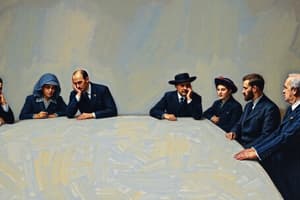Podcast
Questions and Answers
What was the primary aim of the League of Nations, and how did it plan to achieve it?
What was the primary aim of the League of Nations, and how did it plan to achieve it?
The primary aim of the League of Nations was to prevent another war and maintain world peace. It planned to achieve this by settling disputes between nations through negotiation.
How did the terms of the Treaty of Versailles affect the German economy and people's sentiments?
How did the terms of the Treaty of Versailles affect the German economy and people's sentiments?
The terms of the Treaty of Versailles created a weak and unstable economy, leading to mass unemployment and hyperinflation, which in turn led to a sense of resentment and bitterness among the German people.
What was the outcome of German colonies after World War I, and which country claimed German New Guinea and Nauru?
What was the outcome of German colonies after World War I, and which country claimed German New Guinea and Nauru?
German colonies were divided between the Allies, and Australia claimed German New Guinea and Nauru.
Which countries were created as a result of the post-World War I settlements, and what was the fate of Italy in the Treaty of Versailles?
Which countries were created as a result of the post-World War I settlements, and what was the fate of Italy in the Treaty of Versailles?
Which world leaders were known as the 'Big Four' during the negotiations for the Treaty of Versailles, and what were their nationalities?
Which world leaders were known as the 'Big Four' during the negotiations for the Treaty of Versailles, and what were their nationalities?
Flashcards are hidden until you start studying
Study Notes
The League of Nations
- Established in 1920 as a result of the Treaty of Versailles
- First international organization formed to maintain world peace and prevent future wars
- Aimed to encourage nations to negotiate with each other rather than engage in military conflicts
- Had no armed forces of its own and little power to force members to comply with its decisions
- Failed to prevent another world war
The Treaty of Versailles
- Devastating for Germany, both politically and economically
- Created a weak and unstable economy, with mass unemployment and hyperinflation
- Led to a sense of resentment and bitterness among the German people
- Exploited by German politicians during the 1920s and 1930s
- Alienated some of the Allies, including Italy who received few benefits for joining the Allies
Nationalism and Militarism
- Nationalism: a sense of pride in, and love of, one's country; also the idea that one nation's culture and interests are superior to those of another nation
- Militarism: a focus within a country on boosting the strength of the military by growing the armed forces and increasing spending on military equipment
- Contributed to the breakdown in Japan's relations with the West and the rise of Japanese nationalism and militarism
Territorial Disputes
- Japan was permitted to keep Chinese territory it had seized from Germany during the war
- Japan unsuccessfully tried to introduce a 'racial equality' clause into the Treaty of Versailles
- Clause was opposed by Britain and Australia in particular
- The Treaty of Versailles also led to the creation of Czechoslovakia and Yugoslavia
Studying That Suits You
Use AI to generate personalized quizzes and flashcards to suit your learning preferences.




